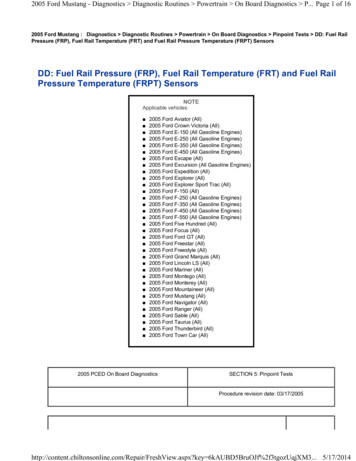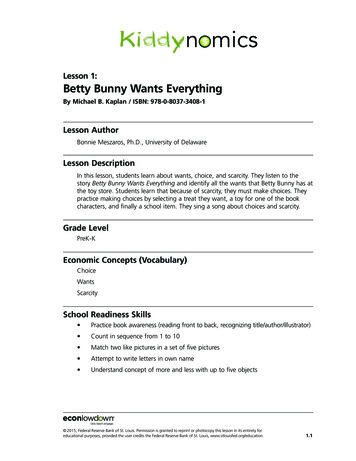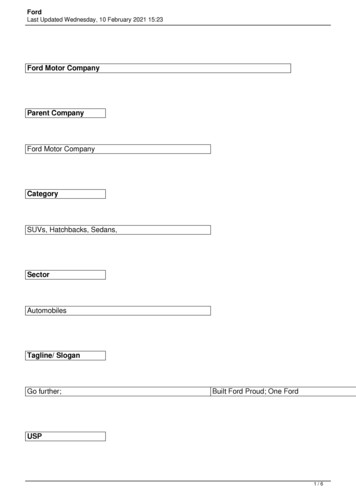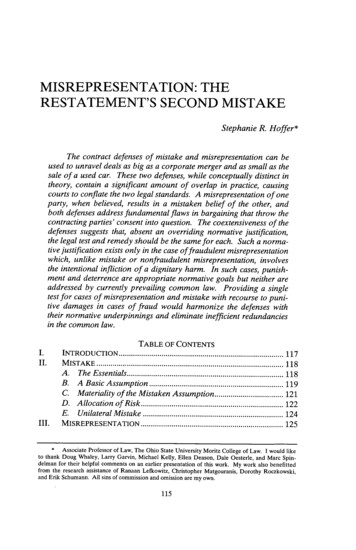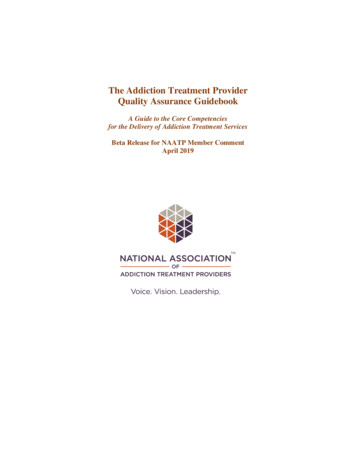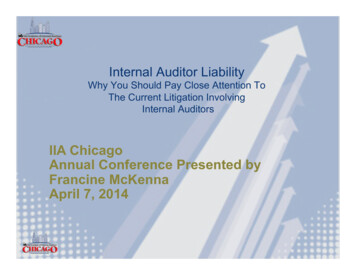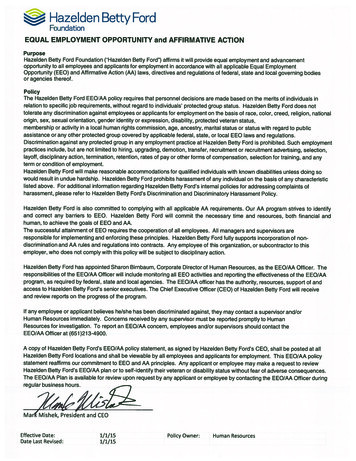
Transcription
Hazelden Betty FordFoundationEQUAL EMPLOYMENT OPPORTUNITY and AFFIRMATIVE ACTIONPurposeHazelden Betty Ford Foundation (“Hazelden Betty Ford”) affirms it will provide equal employment and advancementopportunity to all employees and applicants for employment in accordance with all applicable Equal EmploymentOpportunity (EEC) and Affirmative Action (AA) laws, directives and regulations of federal, state and local governing bodiesor agencies thereof.PolicyThe Hazelden Betty Ford EEO/AA policy requires that personnel decisions are made based on the merits of individuals inrelation to specific job requirements, without regard to individuals’ protected group status. Hazelden Betty Ford does nottolerate any discrimination against employees or applicants for employment on the basis of race, color, creed, religion, nationalorigin, sex, sexual orientation, gender identity or expression, disability, protected veteran status,membership or activity in a local human rights commission, age, ancestry, marital status or status with regard to publicassistance or any other protected group covered by applicable federal, state, or local EEC laws and regulations.Discrimination against any protected group in any employment practice at Hazelden Betty Ford is prohibited. Such employmentpractices include, but are not limited to hiring, upgrading, demotion, transfer, recruitment or recruitment advertising, selection,layoff, disciplinary action, termination, retention, rates of pay or other forms of compensation, selection for training, and anyterm or condition of employment.Hazelden Betty Ford will make reasonable accommodations for qualified individuals with known disabilities unless doing sowould result in undue hardship. Hazelden Betty Ford prohibits harassment of any individual on the basis of any characteristiclisted above. For additional information regarding Hazelden Betty Ford’s internal policies for addressing complaints ofharassment, please refer to Hazelden Betty Ford’s Discrimination and Discriminatory Harassment Policy.Hazelden Betty Ford is also committed to complying with all applicable AA requirements. Our AA program strives to identifyand correct any barriers to EEC. Hazelden Betty Ford will commit the necessary time and resources, both financial andhuman, to achieve the goals of EEC and AA.The successful attainment of EEC requires the cooperation of all employees. All managers and supervisors areresponsible for implementing and enforcing these principles. Hazelden Betty Ford fully supports incorporation of nondiscrimination and AA rules and regulations into contracts. Any employee of this organization, or subcontractor to thisemployer, who does not comply with this policy will be subject to disciplinary action.Hazelden Betty Ford has appointed Sharon Birnbaum, Corporate Director of Human Resources, as the EEO/AA Officer. Theresponsibilities of the EEO/AA Officer will include monitoring all EEC activities and reporting the effectiveness of the EEO/AAprogram, as required by federal, state and local agencies. The EEO/AA officer has the authority, resources, support of andaccess to Hazelden Betty Ford’s senior executives. The Chief Executive Officer (CEO) of Hazelden Betty Ford will receiveand review reports on the progress of the program.If any employee or applicant believes he/she has been discriminated against, they may contact a supervisor and/orHuman Resources immediately. Concerns received by any supervisor must be reported promptly to HumanResources for investigation. To report an EEC/AA concern, employees and/or supervisors should contact theEEO/AA Officer at (651)213-4900.A copy of Hazelden Betty Ford’s EEO/AA policy statement, as signed by Hazelden Betty Ford’s CEO, shall be posted at allHazelden Betty Ford locations and shall be viewable by all employees and applicants for employment. This EEO/AA policystatement reaffirms our commitment to EEC and AA principles. Any applicant or employee may make a request to reviewHazelden Betty Ford’s EEO/AA plan or to self-identify their veteran or disability status without fear of adverse consequences.The EEO/AA Plan is available for review upon request by any applicant or employee by contacting the EEO/AA Officer duringregular business hours.Mar Mishek, President and CEOEffective Date:Date Last Revised:1/1/151/1/15Policy Owner:Human Resources
THE LAWEqual Employment Opportunity isPrivate Employers, State and Local Governments, Educational Institutions, EmploymentAgencies and Labor OrganizationsApplicants to and employees of most private employers, state and local governments, educationalinstitutions, employment agencies and labor organizations are protected under Federal law fromdiscrimination on the following bases:RACE, COLOR, RELIGION, SEX, NATIONAL ORIGINTitle VII of the Civil Rights Act of 1964, as amended, protects applicants and employees from discrimination inhiring, promotion, discharge, pay, fringe benefits, job training, classification, referral, and other aspects ofemployment, on the basis of race, color, religion, sex (including pregnancy), or national origin. Religiousdiscrimination includes failing to reasonably accommodate an employee’s religious practices where theaccommodation does not impose undue hardship.DISABILITYTitle I and Title V of the Americans with Disabilities Act of 1990, as amended, protect qualified individualsfrom discrimination on the basis of disability in hiring, promotion, discharge, pay, fringe benefits, job training,classification, referral, and other aspects of employment. Disability discrimination includes not makingreasonable accommodation to the known physical or mental limitations of an otherwise qualified individualwith a disability who is an applicant or employee, barring undue hardship.AGEThe Age Discrimination in Employment Act of 1967, as amended, protects applicants and employees 40 yearsof age or older from discrimination based on age in hiring, promotion, discharge, pay, fringe benefits, jobtraining, classification, referral, and other aspects of employment.SEX (WAGES)In addition to sex discrimination prohibited by Title VII of the Civil Rights Act, as amended, the Equal Pay Actof 1963, as amended, prohibits sex discrimination in the payment of wages to women and men performingsubstantially equal work, in jobs that require equal skill, effort, and responsibility, under similar workingconditions, in the same establishment.
GENETICSTitle II of the Genetic Information Nondiscrimination Act of 2008 protects applicants and employees fromdiscrimination based on genetic information in hiring, promotion, discharge, pay, fringe benefits, job training,classification, referral, and other aspects of employment. GINA also restricts employers’ acquisition ofgenetic information and strictly limits disclosure of genetic information. Genetic information includesinformation about genetic tests of applicants, employees, or their family members; the manifestation ofdiseases or disorders in family members (family medical history); and requests for or receipt of geneticservices by applicants, employees, or their family members.RETALIATIONAll of these Federal laws prohibit covered entities from retaliating against a person who files a charge ofdiscrimination, participates in a discrimination proceeding, or otherwise opposes an unlawful employmentpractice.WHAT TO DO IF YOU BELIEVE DISCRIMINATION HAS OCCURREDThere are strict time limits for filing charges of employment discrimination. To preserve the ability of EEOC toact on your behalf and to protect your right to file a private lawsuit, should you ultimately need to, youshould contact EEOC promptly when discrimination is suspected: The U.S. Equal Employment OpportunityCommission (EEOC), 1-800-669-4000 (toll-free) or 1-800-669-6820 (toll-free TTY number for individuals withhearing impairments). EEOC field office information is available at www.eeoc.gov or in most telephonedirectories in the U.S. Government or Federal Government section. Additional information about EEOC,including information about charge filing, is available at www.eeoc.gov.Employers Holding Federal Contracts or SubcontractsApplicants to and employees of companies with a Federal government contract or subcontract are protectedunder Federal law from discrimination on the following bases:RACE, COLOR, RELIGION, SEX, NATIONAL ORIGINExecutive Order 11246, as amended, prohibits job discrimination on the basis of race, color, religion, sex ornational origin, and requires affirmative action to ensure equality of opportunity in all aspects ofemployment.INDIVIDUALS WITH DISABILITIESSection 503 of the Rehabilitation Act of 1973, as amended, protects qualified individuals from discriminationon the basis of disability in hiring, promotion, discharge, pay, fringe benefits, job training, classification,referral, and other aspects of employment. Disability discrimination includes not making reasonableaccommodation to the known physical or mental limitations of an otherwise qualified individual with adisability who is an applicant or employee, barring undue hardship. Section 503 also requires that Federalcontractors take affirmative action to employ and advance in employment qualified individuals withdisabilities at all levels of employment, including the executive level.
DISABLED, RECENTLY SEPARATED, OTHER PROTECTED, AND ARMED FORCES SERVICEMEDAL VETERANSThe Vietnam Era Veterans’ Readjustment Assistance Act of 1974, as amended, 38 U.S.C. 4212, prohibits jobdiscrimination and requires affirmative action to employ and advance in employment disabled veterans,recently separated veterans (within three years of discharge or release from active duty), other protectedveterans (veterans who served during a war or in a campaign or expedition for which a campaign badge hasbeen authorized), and Armed Forces service medal veterans (veterans who, while on active duty, participatedin a U.S. military operation for which an Armed Forces service medal was awarded).RETALIATIONRetaliation is prohibited against a person who files a complaint of discrimination, participates in an OFCCPproceeding, or otherwise opposes discrimination under these Federal laws.Any person who believes a contractor has violated its nondiscrimination or affirmative action obligationsunder the authorities above should contact immediately:The Office of Federal Contract Compliance Programs (OFCCP), U.S. Department of Labor, 200 ConstitutionAvenue, N.W., Washington, D.C. 20210, 1-800-397-6251 (toll-free) or (202) 693-1337 (TTY). OFCCP may alsobe contacted by e-mail at OFCCP-Public@dol.gov, or by calling an OFCCP regional or district office, listed inmost telephone directories under U.S. Government, Department of Labor.Programs or Activities Receiving Federal Financial AssistanceRACE, COLOR, NATIONAL ORIGIN, SEXIn addition to the protections of Title VII of the Civil Rights Act of 1964, as amended, Title VI of the Civil RightsAct of 1964, as amended, prohibits discrimination on the basis of race, color or national origin in programs oractivities receiving Federal financial assistance. Employment discrimination is covered by Title VI if theprimary objective of the financial assistance is provision of employment, or where employmentdiscrimination causes or may cause discrimination in providing services under such programs. Title IX of theEducation Amendments of 1972 prohibits employment discrimination on the basis of sex in educationalprograms or activities which receive Federal financial assistance.INDIVIDUALS WITH DISABILITIESSection 504 of the Rehabilitation Act of 1973, as amended, prohibits employment discrimination on the basisof disability in any program or activity which receives Federal financial assistance. Discrimination isprohibited in all aspects of employment against persons with disabilities who, with or without reasonableaccommodation, can perform the essential functions of the job.If you believe you have been discriminated against in a program of any institution which receives Federalfinancial assistance, you should immediately contact the Federal agency providing such assistance.EEOC 9/02 and OFCCP 8/08 Versions Useable With 11/09 SupplementEEOC-P/E-1 (Revised 11/09)
EMPLOYEERIGHTSUNDER THE FAMILY AND MEDICAL LEAVE ACTTHE UNITED STATES DEPARTMENT OF LABOR WAGE AND HOUR DIVISIONLEAVEENTITLEMENTSEligible employees who work for a covered employer can take up to 12 weeks of unpaid, job-protected leave in a 12-month periodfor the following reasons: The birth of a child or placement of a child for adoption or foster care;To bond with a child (leave must be taken within 1 year of the child’s birth or placement);To care for the employee’s spouse, child, or parent who has a qualifying serious health condition;For the employee’s own qualifying serious health condition that makes the employee unable to perform the employee’s job;For qualifying exigencies related to the foreign deployment of a military member who is the employee’s spouse,child, or parent.An eligible employee who is a covered servicemember’s spouse, child, parent, or next of kin may also take up to 26 weeksof FMLA leave in a single 12-month period to care for the servicemember with a serious injury or illness.An employee does not need to use leave in one block. When it is medically necessary or otherwise permitted, employeesmay take leave intermittently or on a reduced schedule.Employees may choose, or an employer may require, use of accrued paid leave while taking FMLA leave. If an employeesubstitutes accrued paid leave for FMLA leave, the employee must comply with the employer’s normal paid leave policies.BENEFITS &PROTECTIONSWhile employees are on FMLA leave, employers must continue health insurance coverage as if the employees were not on leave.Upon return from FMLA leave, most employees must be restored to the same job or one nearly identical to it withequivalent pay, benefits, and other employment terms and conditions.An employer may not interfere with an individual’s FMLA rights or retaliate against someone for using or trying to use FMLA leave,opposing any practice made unlawful by the FMLA, or being involved in any proceeding under or related to the FMLA.ELIGIBILITYREQUIREMENTSAn employee who works for a covered employer must meet three criteria in order to be eligible for FMLA leave. The employee must: Have worked for the employer for at least 12 months;Have at least 1,250 hours of service in the 12 months before taking leave;* andWork at a location where the employer has at least 50 employees within 75 miles of the employee’s worksite.*Special “hours of service” requirements apply to airline flight crew employees.REQUESTINGLEAVEGenerally, employees must give 30-days’ advance notice of the need for FMLA leave. If it is not possible to give 30-days’ notice,an employee must notify the employer as soon as possible and, generally, follow the employer’s usual procedures.Employees do not have to share a medical diagnosis, but must provide enough information to the employer so it can determineif the leave qualifies for FMLA protection. Sufficient information could include informing an employer that the employee is orwill be unable to perform his or her job functions, that a family member cannot perform daily activities, or that hospitalization orcontinuing medical treatment is necessary. Employees must inform the employer if the need for leave is for a reason for whichFMLA leave was previously taken or certified.Employers can require a certification or periodic recertification supporting the need for leave. If the employer determines that thecertification is incomplete, it must provide a written notice indicating what additional information is required.EMPLOYERRESPONSIBILITIESOnce an employer becomes aware that an employee’s need for leave is for a reason that may qualify under the FMLA, theemployer must notify the employee if he or she is eligible for FMLA leave and, if eligible, must also provide a notice of rights andresponsibilities under the FMLA. If the employee is not eligible, the employer must provide a reason for ineligibility.Employers must notify its employees if leave will be designated as FMLA leave, and if so, how much leave will be designated asFMLA leave.ENFORCEMENTEmployees may file a complaint with the U.S. Department of Labor, Wage and Hour Division, or may bring a private lawsuitagainst an employer.The FMLA does not affect any federal or state law prohibiting discrimination or supersede any state or local law or collectivebargaining agreement that provides greater family or medical leave rights.For additional information or to file a complaint:1-866-4-USWAGE(1-866-487-9243)TTY: 1-877-889-5627www.dol.gov/whdU.S. Department of LaborWage and Hour DivisionWH1420 REV 04/16
EMPLOYEE RIGHTSEMPLOYEE POLYGRAPH PROTECTION ACTThe Employee Polygraph Protection Actprohibits most private employers from usinglie detector tests either for pre-employmentscreening or during the course of employment.PROHIBITIONSEmployers are generally prohibited from requiring or requestingany employee or job applicant to take a lie detector test, and fromdischarging, disciplining, or discriminating against an employee orprospective employee for refusing to take a test or for exercising otherrights under the Act.EXEMPTIONSFederal, State and local governments are not affected by the law. Also,the law does not apply to tests given by the Federal Government tocertain private individuals engaged in national security-related activities.The Act permits polygraph (a kind of lie detector) tests to be administeredin the private sector, subject to restrictions, to certain prospectiveemployees of security service firms (armored car, alarm, and guard), andof pharmaceutical manufacturers, distributors and dispensers.The Act also permits polygraph testing, subject to restrictions, of certainemployees of private firms who are reasonably suspected of involvementin a workplace incident (theft, embezzlement, etc.) that resulted ineconomic loss to the employer.The law does not preempt any provision of any State or local law or anycollective bargaining agreement which is more restrictive with respect tolie detector tests.EXAMINEERIGHTSWhere polygraph tests are permitted, they are subject to numerous strictstandards concerning the conduct and length of the test. Examineeshave a number of specific rights, including the right to a written noticebefore testing, the right to refuse or discontinue a test, and the right notto have test results disclosed to unauthorized persons.ENFORCEMENT The Secretary of Labor may bring court actions to restrain violations andassess civil penalties against violators. Employees or job applicants mayalso bring their own court actions.THE LAW REQUIRES EMPLOYERS TO DISPLAY THIS POSTERWHERE EMPLOYEES AND JOB APPLICANTS CAN READILY SEE IT.WAGE AND HOUR DIVISIONUNITED STATES DEPARTMENT OF LABOR1-866-487-9243TTY: 1-877-889-5627www.dol.gov/whdWH1462 REV 07/16
Hazelden Betty Ford has appointed Sharon Birnbaum, Corporate Director of Human Resources, as the EEO/AA Officer. The responsibilities of the EEO/AA Officer will include monitoring all EEC activities and reporting the effectiveness of the EEO/AA program, as required by federal, state and local agencies. The EEO/AA officer has the authority .
